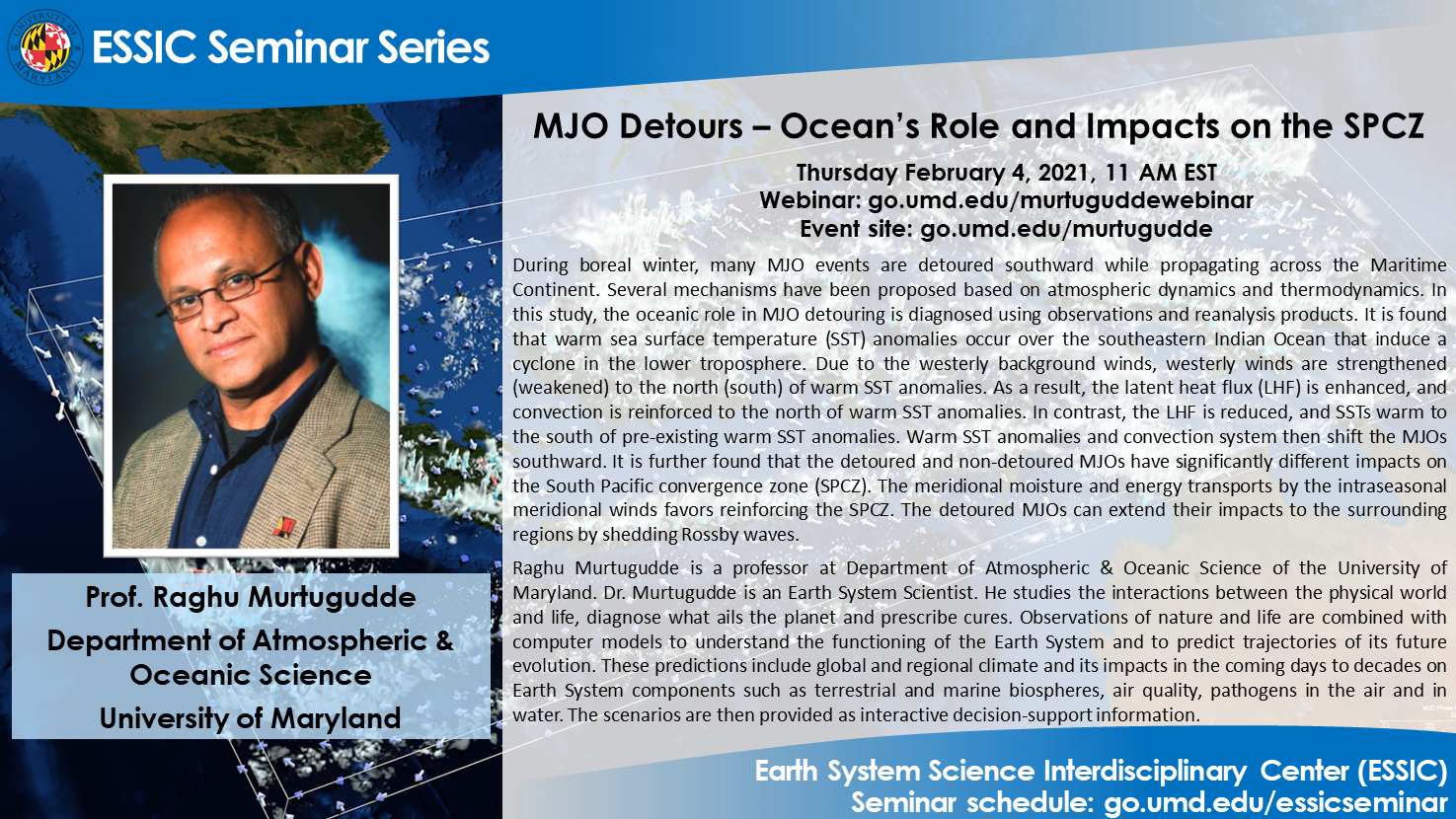
MJO Detours – Ocean’s Role and Impacts on the SPCZ
Prof. Raghu Murtugudde
University of Maryland
February 4, 2021, 11 AM EST
Prof. Murtugudde will be joining us from overseas. The time zone difference plays a role and so the seminar will take place on Thursday, February 4 at 11 AM EST.
Abstract:
During boreal winter, many MJO events are detoured southward while propagating across the Maritime Continent. Several mechanisms have been proposed based on atmospheric dynamics and thermodynamics. In this study, the oceanic role in MJO detouring is diagnosed using observations and reanalysis products. It is found that warm sea surface temperature (SST) anomalies occur over the southeastern Indian Ocean that induce a cyclone in the lower troposphere. Due to the westerly background winds, westerly winds are strengthened (weakened) to the north (south) of warm SST anomalies. As a result, the latent heat flux (LHF) is enhanced, and convection is reinforced to the north of warm SST anomalies. In contrast, the LHF is reduced, and SSTs warm to the south of pre-existing warm SST anomalies. Warm SST anomalies and convection system then shift the MJOs southward before they reach the Maritime Continent. It is further found that the detoured and non-detoured MJOs have significantly different impacts on the South Pacific convergence zone (SPCZ). The meridional moisture and energy transports by the intraseasonal meridional winds are favorable for reinforcing the SPCZ. The detoured MJOs can extend their impacts to the surrounding regions by shedding Rossby waves. Further studies on such processes are expected to contribute to a better understanding of extreme climate and natural disasters on the rim of the southern Pacific Ocean and Indian Ocean, such as recent devastating wildfires in Australia.
Bio-sketch:
Raghu Murtugudde is a professor at Department of Atmospheric & Oceanic Science of the University of Maryland. Dr. Murtugudde is an Earth System Scientist. He studies the interactions between the physical world and life and train Earth System doctors for taking the pulse of the planet, diagnose what ails the planet and prescribe cures and preventive measures. Observations of nature and life are combined with computer models to understand the functioning of the Earth System and to predict trajectories of its future evolution. These predictions include global and regional climate and its impacts in the coming days to decades on Earth System components such as terrestrial and marine biospheres, air quality, pathogens in the air and in water. The scenarios are then provided as interactive decision-support information to stakeholders ranging from resource managers, health workers, and policy makers to the general public. The ultimate goal is to continuously monitor the functioning of the Earth System and sustainably navigate its future evolution with designer Earth System forecasts.
Webinar info:
Webinar thread: https://go.umd.edu/murtuguddewebinar
Event site: https://go.umd.edu/murtugudde
Webinar number: 120 147 4487
Webinar password: essic
To join the audio conference only:
US Toll: +1-415-655-0002
Global call-in numbers
For IT assistance:
Cazzy Medley: cazzy@umd.edu
Travis Swaim: tswaim1@umd.edu
Resources:
Seminar schedule & archive: https://go.umd.edu/essicseminar
Seminar Google calendar: https://go.umd.edu/essicseminarcalendar
Seminar recordings on Youtube: https://www.youtube.com/user/ESSICUMD

